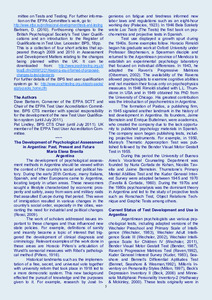Please use this identifier to cite or link to this item:
https://repositorio.uca.edu.ar/handle/123456789/15182| Título: | The development of psychological assessment in Argentina: past, present and future | Autor: | Brenlla, María Elena | Palabras clave: | EVALUACION PSICOLOGICA; Argentina; DESARROLLO PROFESIONAL | Fecha de publicación: | 2011 | Editorial: | International Test Comission | Cita: | Brenlla, M.E. The development of psychological assessment in Argentina: past, present and future [en línea]. Testing International. 2011, 26 Disponible en: https://repositorio.uca.edu.ar/handle/123456789/15182 | Resumen: | Abstract: The development of psychological assessment methods in Argentina should be viewed within the context of the country’s social and political history. During the early 20th Century, many Italians, Spanish, and other Europeans came to Argentina, locating largely in urban areas. These newcomers sought a lifestyle characterized by economic prosperity and safety, away from wars and military raids that assaulted Europe during that period. This wave of immigration resulted in various changes in the country’s social order, especially in the cities, warranting the need for industrial and political changes (Rossi, 2009). The work of scholars addressed issues important to these changes and thus influenced new state policies. For example, definitions of sanity and insanity became a topic of interest that triggered the development of clinical diagnosis and criminology. Relevant examples of the work done in these areas are Horacio Piñero’s articulation of Wundt’s sensorial measures with Ribot’s pathological method (Piñero, 1916). | URI: | https://repositorio.uca.edu.ar/handle/123456789/15182 | Disciplina: | PSICOLOGIA | Derechos: | Acceso abierto | Fuente: | Testing International. 2011, 26 |
| Appears in Collections: | Artículos |
Files in This Item:
| File | Description | Size | Format | |
|---|---|---|---|---|
| development-psychological-assessment.pdf | 160,86 kB | Adobe PDF |  View/Open |
Page view(s)
42
checked on Apr 27, 2024
Download(s)
34
checked on Apr 27, 2024
Google ScholarTM
Check
This item is licensed under a Creative Commons License

